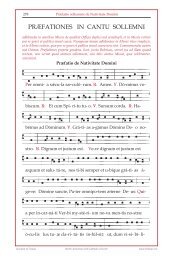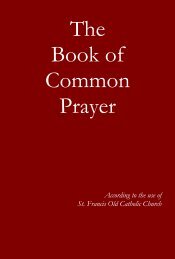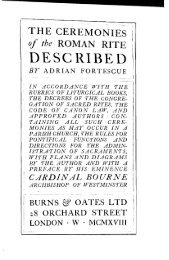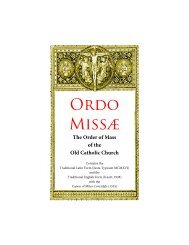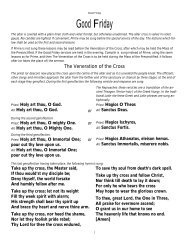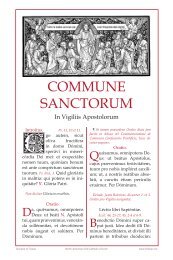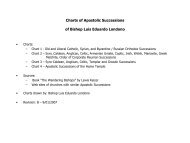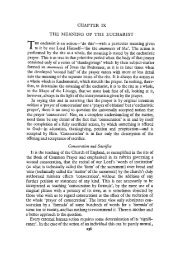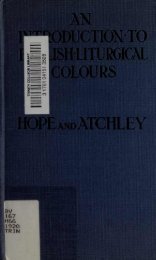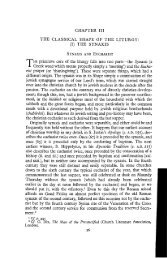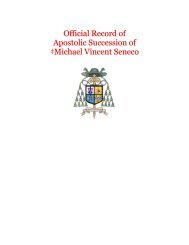Eucharist and Lord's Supper
Eucharist and Lord's Supper
Eucharist and Lord's Supper
Create successful ePaper yourself
Turn your PDF publications into a flip-book with our unique Google optimized e-Paper software.
92 THE SHAPE OF THE LITURGY<br />
the three ideas: (a) thanksgiving for earthly food; (b) thanksgiving for the<br />
'spiritual food <strong>and</strong> drink' (of the eucharist proper) which is of the essence<br />
of the New Covenant; (c) prayer for the church. These recall the three<br />
jewish paragraphs of (a) thanksgiving for earthly food; (b) thanksgiving<br />
for the Old Covenant, with its essence in the Law <strong>and</strong> Circumcision; (c)<br />
prayer for jewry. But there is in this rite no cup of blessing accompanying<br />
the Thanksgiving, which is precisely the distinction between eucharist <strong>and</strong><br />
agape. And when the substance ofthe prayers-beautiful in themselvesis<br />
considered, is it possible to see in them anything whatever but grace<br />
before <strong>and</strong> after meals?! The Didache knows <strong>and</strong> quotes the gospel of Matt.<br />
It is surely incredible that the author could have ignored the close connection<br />
of the eucharist proper with the passion established in Matt. xxvi.<br />
What, then, are we to make of the word eucharistia, etc., so repeatedly<br />
used of this cup <strong>and</strong> bread? It seems to me to prove exactly nothing. We<br />
have already seen that in early christian usage eulogein <strong>and</strong> eucharistein are<br />
used indifferently to translate the single Hebrew verb berakh, <strong>and</strong> these<br />
prayers are undoubtedly what a jew would have called berakotlz, for all<br />
their christian content. S. Paul uses eulogein of consecrating the eucharist<br />
proper, <strong>and</strong> eucharistein of blessing meat bought in the public market. By<br />
the time of Hippolytus terminology is settling down; the 'blessed bread' of<br />
the <strong>Lord's</strong> supper is eulogion, clearly distinguished from 'the <strong>Lord's</strong> Body'<br />
of the eucharist. But even he is not quite consistent. When there is no<br />
cleric present at a <strong>Lord's</strong> supper to 'eulogise' the bread, the laity are each<br />
to 'eucharistise' the food for themselves. 2 Earlier terminology had shewn the<br />
same continual lack of precision. Justin speaks of the christians worshipping<br />
God 'with a formula of prayer <strong>and</strong> thanksgiving (eucharistia) for all<br />
our food' (Ap. 1. 13), almost verbally the phrase which he employs for the<br />
consecration of the liturgical eucharist (Ap. 1. 66). The bishop in the<br />
Ethiopic agape-rite above 'eucharistises' a lamp; 'eucharistic' prayers for<br />
the consecration of chrism, bishops, virgins <strong>and</strong> all sorts of things <strong>and</strong><br />
persons are to be found in the Roman Pontifical to this day. The mere<br />
word eucharistia in an early christian document does not at all establish<br />
that the subject concerned is 'the eucharist' in our sense.<br />
Finally, there is the prohibition (ix. 5): 'Let no one eat or drink of your<br />
eucharist but those baptised in the Name of the Lord.' We have already<br />
seen from Hippolytus that the catechumens (<strong>and</strong> other pagans a fortiori)<br />
might not have 'table-fellowship' with the church at the agape any more<br />
than at the eucharist. And here, as a matter of fact, the Didache gives an<br />
1 K. Volker, Mysterium und Agape, pp. 135 sq. strains the sense almost to breaking<br />
point to find a spiritual or quasi-sacramental meaning in them. I confess I remain<br />
completely sceptical when I look at the text. They get no nearer to being 'sacramental'<br />
than does the bishop's lamp-blessing in the Ethiopic rite of the agape above:<br />
'We give thanks unto Thee, 0 God, through Thy Son Jesus Christ our Lord,<br />
because Thou hast enlightened us by revealing the incorruptible light'.<br />
2 Ap. Trad., xxvi. 13 (c/. above, p. 83 h).



